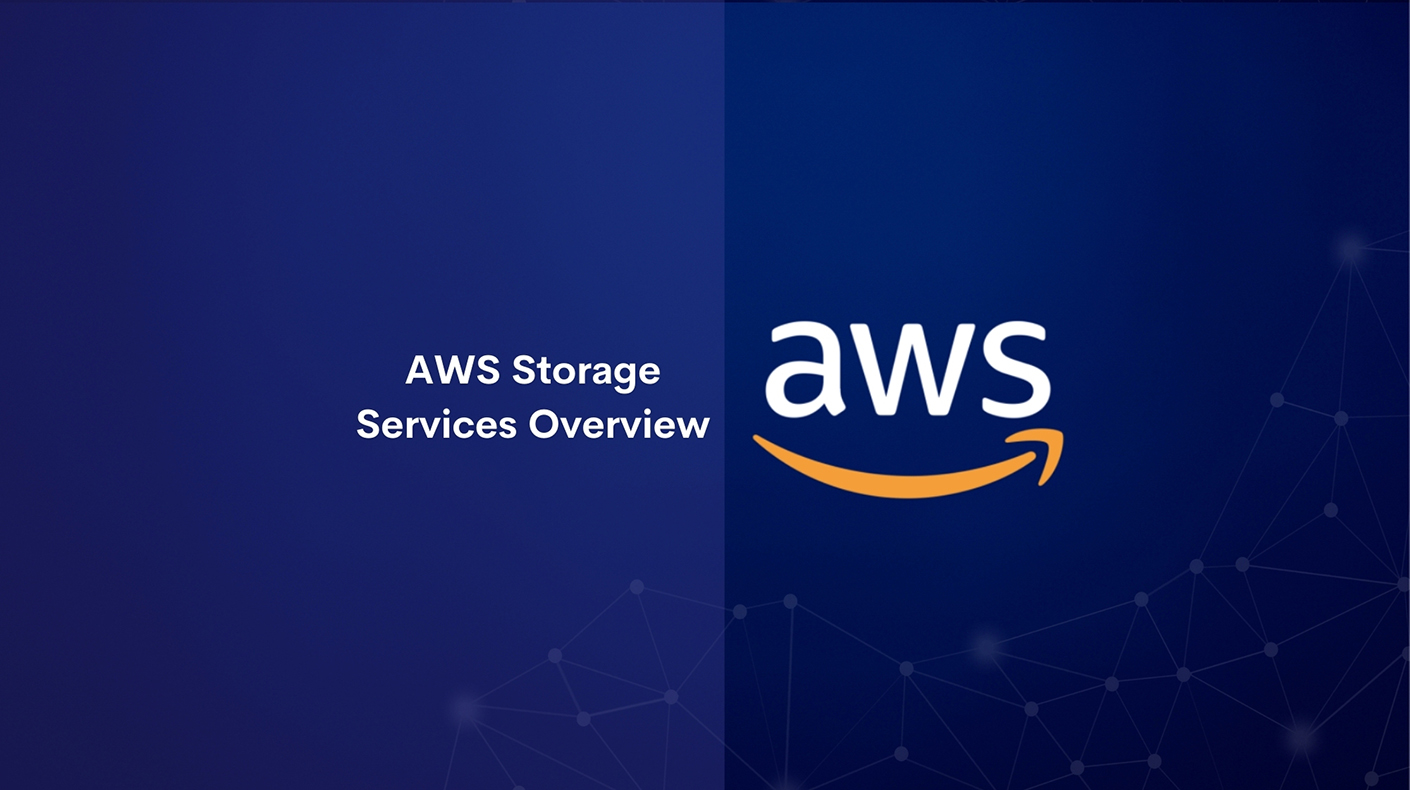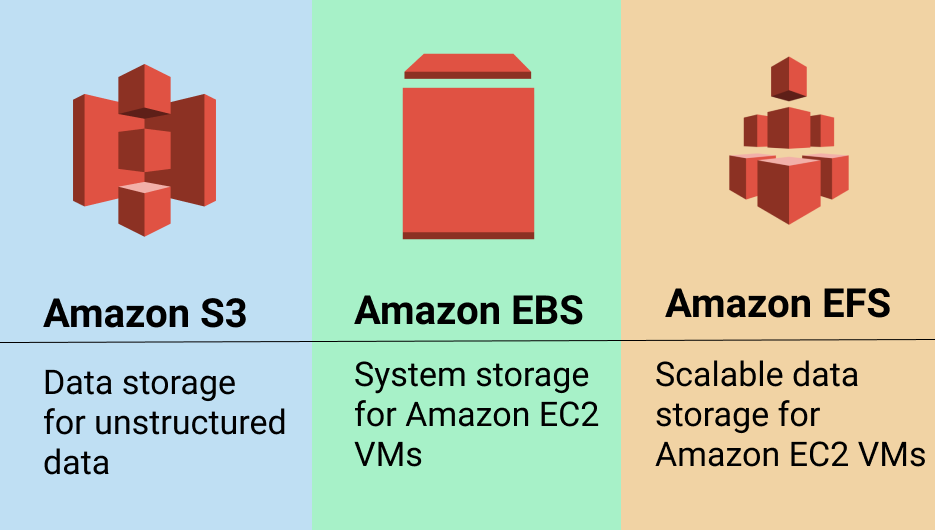Unlocking the Power of Amazon Storage Services 🌥️
 Muhammad Irfan
Muhammad Irfan
Introduction:
Amazon Web Services (AWS) offers a diverse range of storage solutions that cater to businesses and developers alike. With a focus on scalability, durability, and security, these services address various use cases, from simple file storage to complex data archiving. Let’s explore some key offerings! 🔍

1. Amazon S3 (Simple Storage Service)
Amazon S3, or Amazon Simple Storage Service, is a scalable object storage service provided by Amazon Web Services (AWS). It offers industry-leading data availability, security, and performance, allowing customers to store and manage any amount of data for a wide range of use cases. Amazon S3 also provides comprehensive security features, including default encryption and access control tools, making it a reliable choice for data storage in the cloud. Amazon S3 is a go-to solution for high availability and scalability. Key features include:
Object Storage: Store data as objects within buckets, perfect for managing large amounts of unstructured data.
Durability and Availability: Designed for 99.999999999% (11 nines) durability with various storage classes.
Access Management: Control access using AWS IAM and bucket policies.
Event Notifications: Trigger notifications to other AWS services, enabling automated workflows.
2. Amazon EBS (Elastic Block Store)
Amazon Elastic Block Store (EBS) is a high-performance block-storage service designed for use with Amazon Elastic Compute Cloud (EC2) instances. It offers scalable storage solutions that cater to a variety of workloads, from transactional applications to big data analytics engines. With features like high availability, encryption, and snapshot capabilities, Amazon EBS provides a secure and durable storage option. It's particularly beneficial for mission-critical applications that require consistent and low-latency performance, making it a cornerstone of cloud storage within the AWS ecosystem. EBS is ideal for databases and file systems, it features:
Persistent Storage: Volumes persist independently from EC2 instances.
Snapshots: Easily back up EBS volumes using snapshots stored in S3.
Performance: Choose from SSD for high performance or HDD for cost-effective storage.
3. Amazon EFS (Elastic File System)
Amazon Elastic File System (EFS) is a cloud storage service that offers a scalable, elastic, and secure solution for file storage. It allows multiple EC2 instances to access and modify files concurrently, catering to high throughput and low latency applications. Amazon EFS is designed to automatically scale on demand to petabytes of storage, adjusting as files are added or removed, which makes it ideal for a wide range of use cases, from web hosting to big data analytics. Moreover, it supports the NFSv4 protocol and is integrated with AWS compute services like EC2, ECS, EKS, AWS Lambda, and AWS Fargate, ensuring a seamless and flexible user experience. Amazon EFS stands out for its simplicity in setup and automatic scaling, making it a robust choice for modern application development and data science workloads. Key features include:
Scalability: Automatically scales as files are added or removed.
File System Interface: Supports NFS protocol for easy integration.
Shared Access: Multiple EC2 instances can access the same file system simultaneously.
4. Amazon FSx
Amazon FSx is a fully managed file storage service that simplifies the deployment and management of file systems. It offers a variety of file systems including NetApp ONTAP, OpenZFS, Windows File Server, and Lustre, catering to different workloads and performance needs. With Amazon FSx, users can leverage the robustness, security, and scalability of AWS infrastructure, while enjoying features like automatic backups, data replication, and integration with other AWS services. It's designed to provide high performance with sub-millisecond latencies, making it suitable for a wide range of applications, from enterprise workloads to machine learning and high-performance computing. Amazon FSx file systems optimized for specific workloads:
FSx for Windows File Server: Seamlessly integrates with Windows applications and Active Directory.
FSx for Lustre: Perfect for high-performance workloads like machine learning and big data analytics.
5. Amazon Glacier and Glacier Deep Archive
Amazon Glacier and Glacier Deep Archive are cloud-based data storage solutions designed for long-term backup and archival. Amazon Glacier is optimized for data that is infrequently accessed, offering secure and durable storage at a low cost. For data that requires even less frequent access, Glacier Deep Archive provides the lowest cost storage in the cloud, with retrieval times within 12 hours. Both services boast exceptional durability, with data stored across multiple Availability Zones and designed for 99.999999999% durability. These services are ideal for various use cases, including digital preservation, compliance archives, and healthcare records, where Amazon Glacier is designed for cost-effective data archiving:
Cost-Effective Storage: Ideal for archiving large data sets.
Retrieval Options: Choose from different retrieval times, from minutes to hours, based on urgency.
Conclusion
Amazon Web Services (AWS) offers a variety of scalable, secure, and durable storage solutions tailored for different use cases. Key offerings include Amazon S3 for object storage, Amazon EBS for high-performance block storage, Amazon EFS for file storage, Amazon FSx for managed file systems, and Amazon Glacier/Glacier Deep Archive for long-term data archiving. These services ensure high availability, performance, and comprehensive security features, making AWS a robust choice for modern storage needs. 🌟
#CloudWhistlers #Cloudaires #AWS #CloudStorage #DataManagement #AmazonS3 #AmazonEBS #AmazonEFS #AmazonFSx #DataArchiving #CloudComputing #TechInnovation
Subscribe to my newsletter
Read articles from Muhammad Irfan directly inside your inbox. Subscribe to the newsletter, and don't miss out.
Written by

Muhammad Irfan
Muhammad Irfan
I am passionate about the transformative power of Linux, DevOps, and cloud technologies. With a background in system administration, I’m on a journey to master cloud infrastructure, automation, and containerization. On my GitHub, you’ll find projects where I explore automation, AWS, CI/CD, and scripting to solve real-world problems. 📚 Current Focus: Enhancing my expertise in Linux systems, AWS, and scripting. Here, I share insights and experiences from my hands-on projects to help and inspire fellow tech enthusiasts.